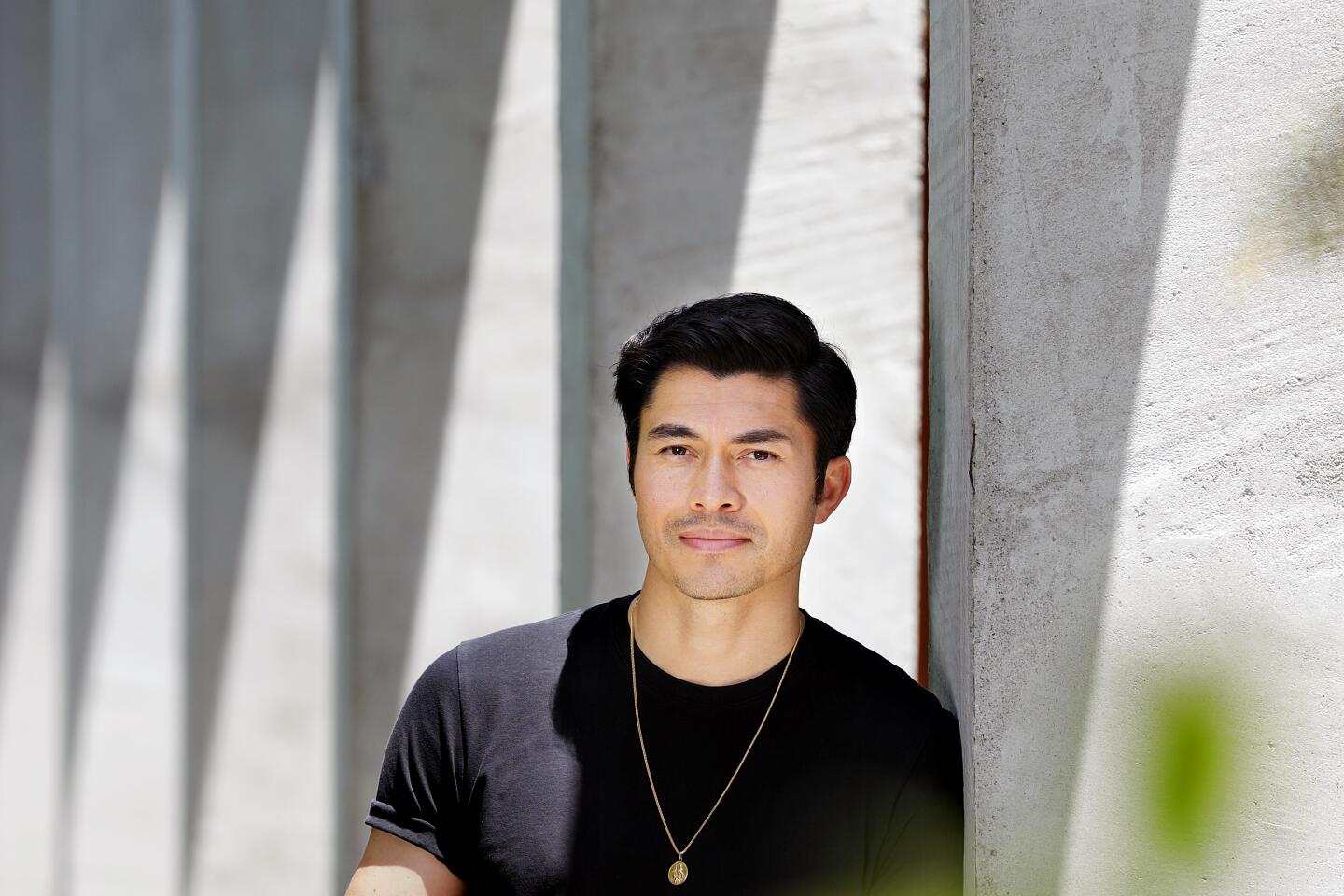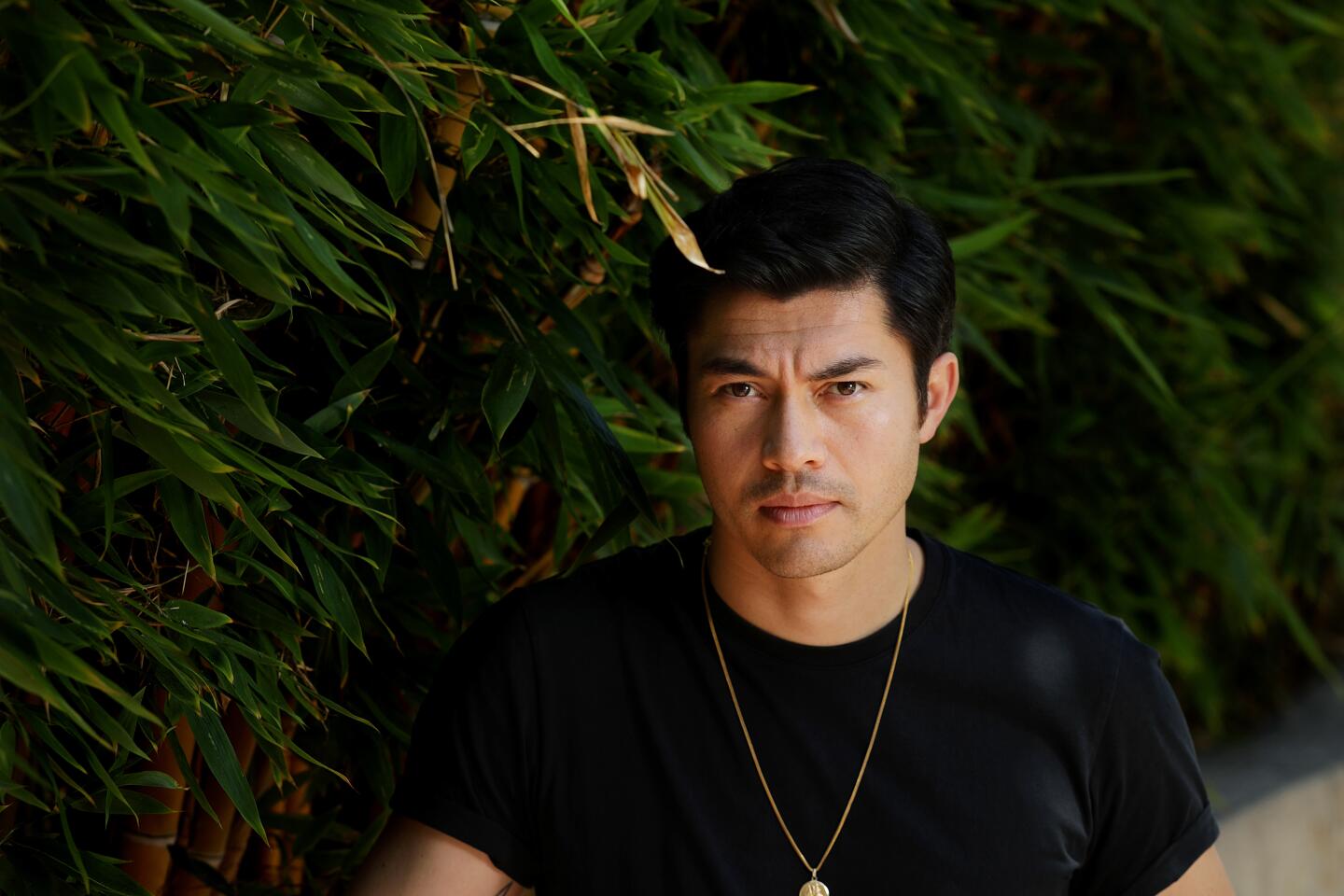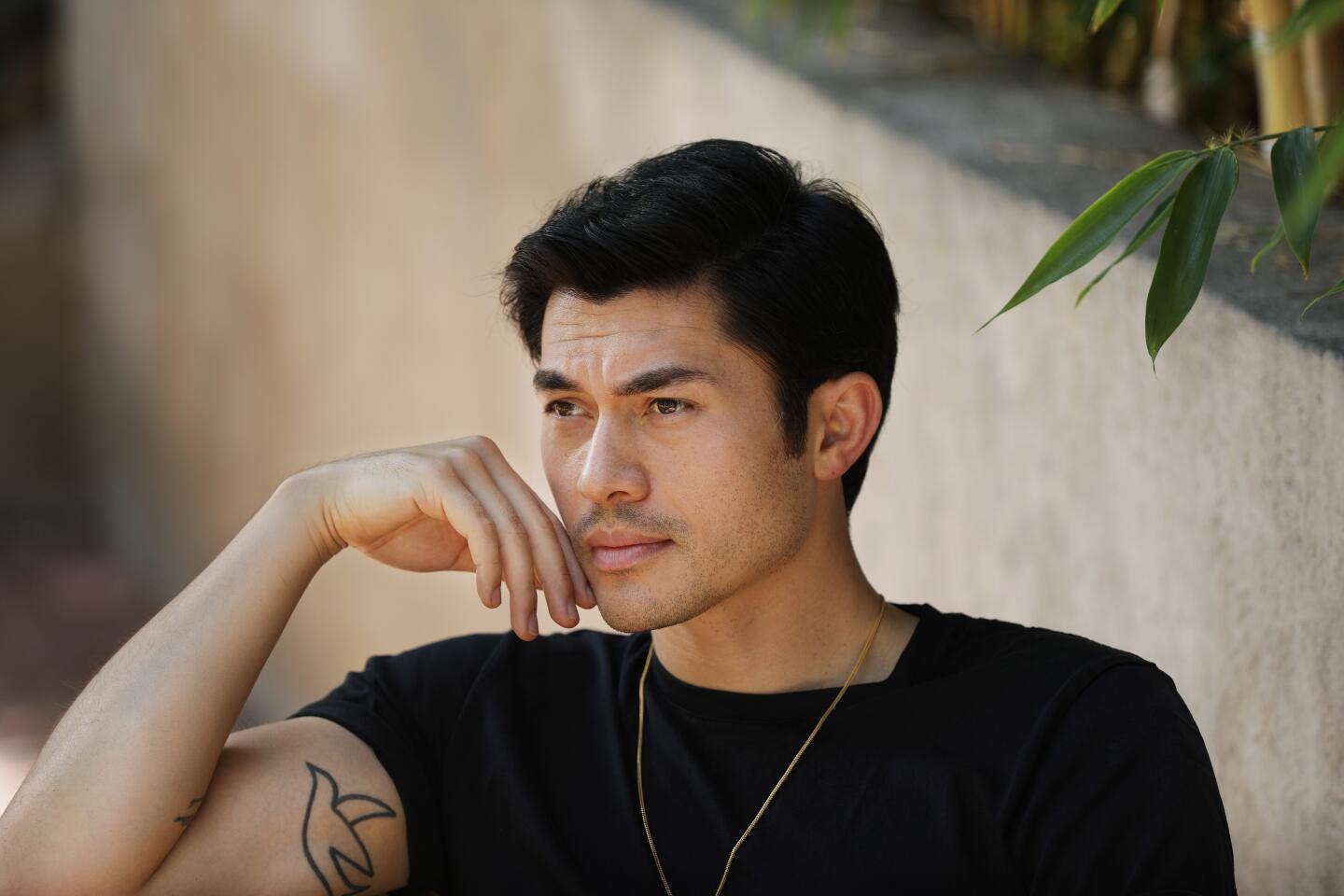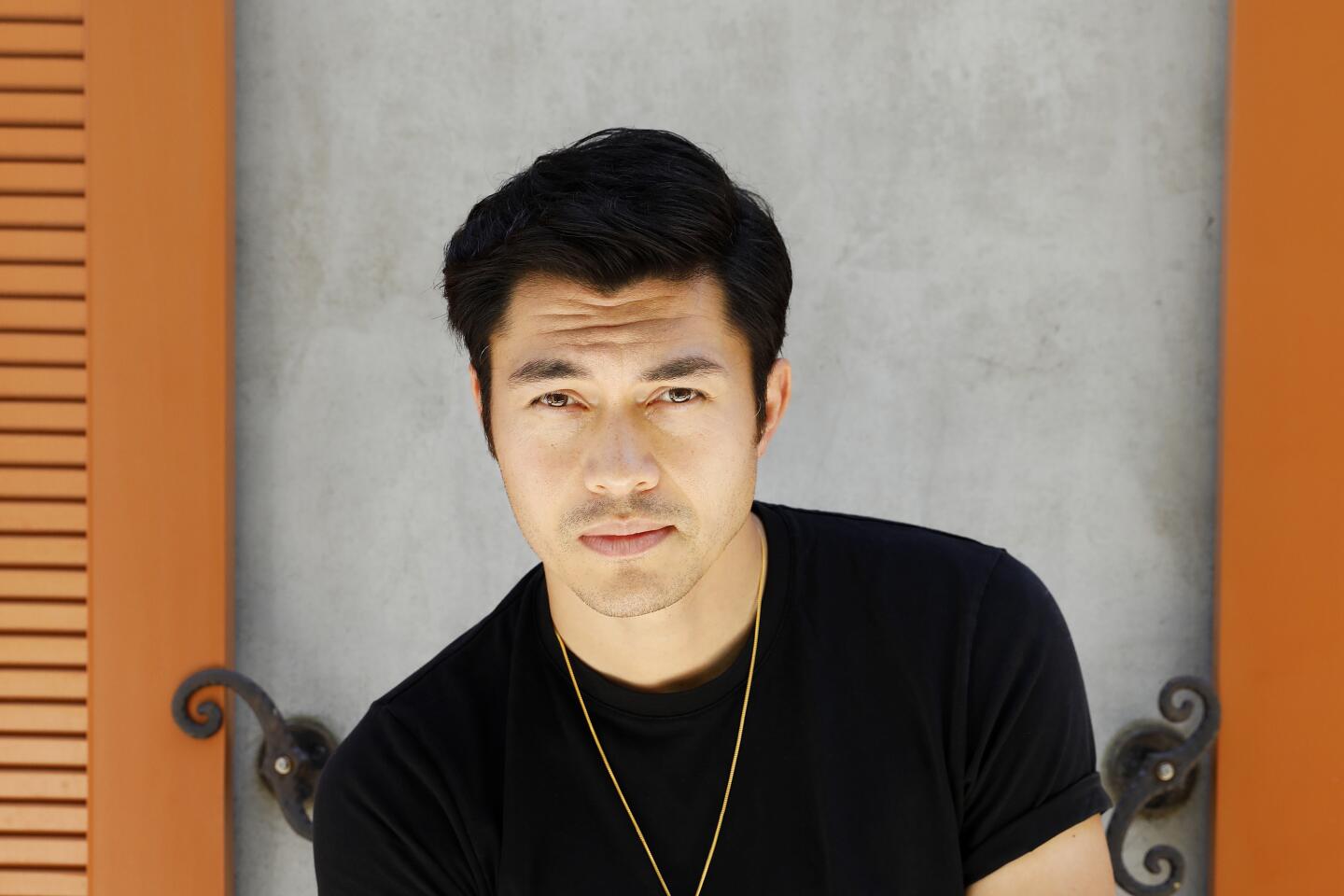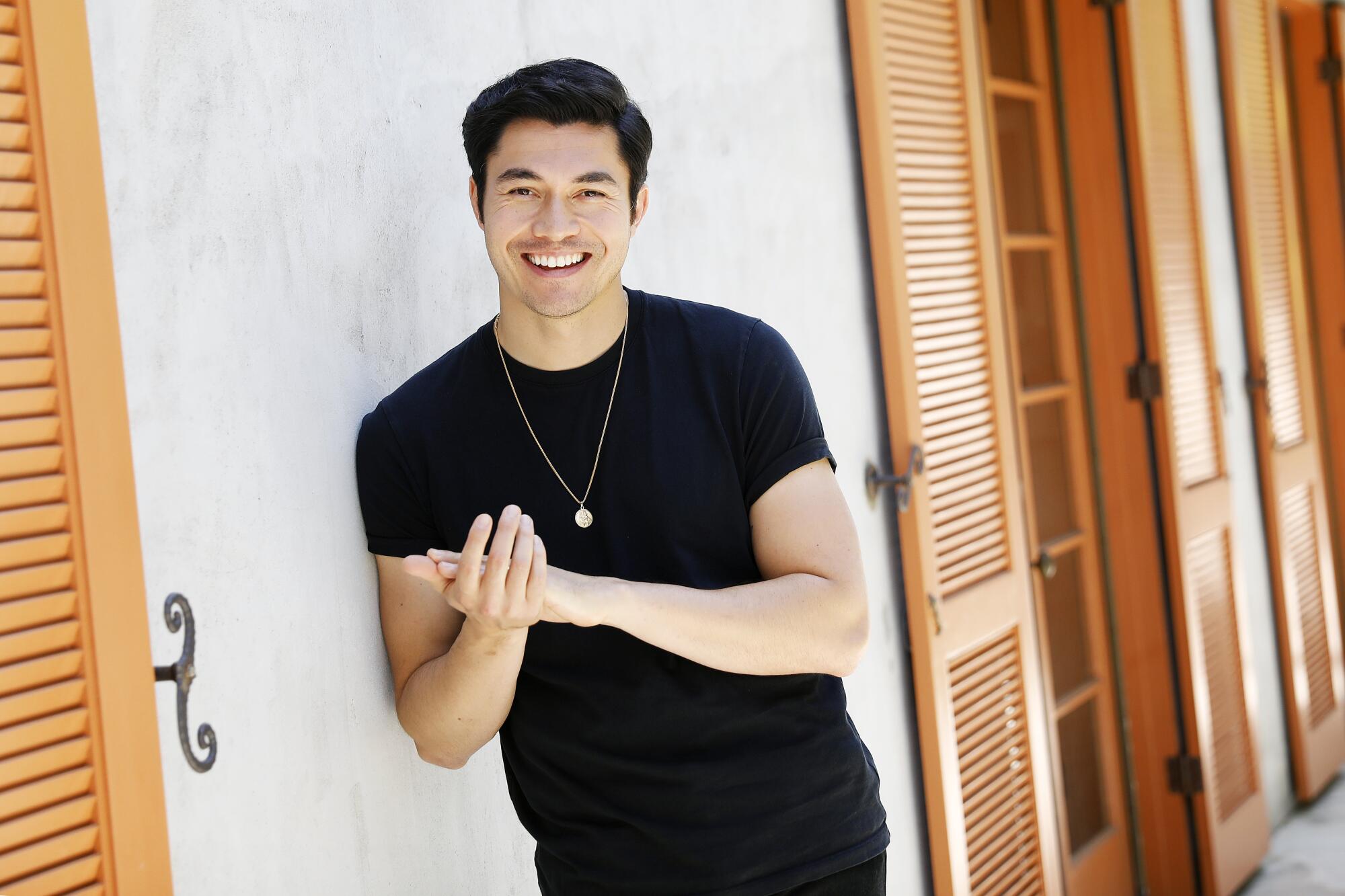
- Share via
In 2018, Henry Golding became an overnight sensation thanks to the runaway success of Jon M. Chu’s “Crazy Rich Asians.”
In the three years since, the 34-year-old Malaysian British actor hasn’t slowed down, having collaborated with Paul Feig twice (in 2018’s “A Simple Favor” and 2019’s “Last Christmas”), holding his own alongside an ensemble cast including Matthew McConaughey and Hugh Grant in Guy Ritchie’s “The Gentlemen” and adding action star to his résumé with the just released spinoff “Snake Eyes: G.I. Joe Origins.” All that and it feels like he’s only begun to show the full spectrum of his range.
He’s also a new dad after he and his wife, Liv Lo, welcomed a baby girl in April.
The Times caught up with Golding to discuss pandemic hobbies, work-life balance and how “The Matrix” changed his life.
What attracted you to the role of Snake Eyes?
G.I. Joe is obviously a huge franchise. I’d watched the films and grew up knowing about [the characters]. So when the studio called, I was like, “Holy crap!”
I was really interested in [director] Robert [Schwentke]’s take, in terms of story. So we went for a coffee and I was like, “I don’t want to be in a generic [remake].” If they’re going to reboot a series, it’s got to be in a different vein, it’s got to be a different style. And he was like “100% that’s my goal.” I really wanted to amp up the human element of these characters because we haven’t seen that.
And especially Snake Eyes being one of the most mysterious [characters with] an unknown background and it being an origin story, it was important to start with him pre-training. We find him at his most broken and at his most troubled as a young man who’s lost his way and is on a journey of vengeance. So [Schwentke said,] “I want to tell the story of how he realigns himself and becomes the Snake Eyes that we all love.” And I was like, “Sold. Let’s go! When do I start training?”
What kind of training did you have to do?
A lot of sword work choreography and fitness. We really [focused] on getting fluid with the choreography and that style of movement with the katana. And that’s where Kenji Tanigaki, the choreographer, came in. He’s synonymous with samurai films and that really fast, high octane sword work. So it was like a solid two months of getting into shape to build up this movement.
How much of your own stunts did you do?
Everything. We did all the choreography. Of course, we had amazing stunt teams doing like the big jumps from [building to building], which we physically and financially can’t afford to do because if something goes wrong, I’m not Tom Cruise [laughs]. So we worked so hard to make sure that every single bit of fight choreography we could do ourselves.
And as Snake, I’m on screen 98% of the time. So day in, day out, it was really physically demanding. It was like a 52-day shoot and I think I had one day off. Obviously you break it up with company moves and weekends and stuff like that, but, yeah, one day off out of all of the shooting days.
It’s always tough the first couple of weeks and then your body just adapts, and suddenly everything’s clicking and you’re like a well oiled machine. By the time you start shooting, they can change up any [moves] and it’ll be fine. You want to get to a point where you get on set and whatever you’ve learned in the gym goes out the window because you need to be able to learn the new choreography in like five minutes.
Do you think you’ve maintained those skills?
I think so. Physically, I might be gasping for air a little bit more, but I can feel the [muscle memory]. You don’t often get to crack it out, but training with the best in the business is something we look forward to as actors.
How do you feel the success of “Crazy Rich Asians” has affected your career?
Massively. It was my first job, so it gave me the break. It gave me these amazing friends that I will carry for the rest of my life and career. Me and Jon Chu have stayed very, very close. It was such a statement to have as a first movie, it’s carried me far for sure. I’ve been really lucky with the choice of work and the opportunities.
Are you excited to return to the “Crazy Rich Asians” story in two back-to-back sequels?
[Laughs] When they get written, sure. I’ll be the first on set.
What’s been your biggest struggle in the industry?
I think it’s being able to say no. Because when you get a successful film like that, you get offers in the same vein or [that are] leveraging the success of “Crazy Rich.” It’s about really hand-picking the projects and the material so you don’t get lumped in or make the wrong decisions in terms of movies. So you’re always trying to do one better or at least on par [with the last film].
What has the experience of the pandemic been like for you?
The silver lining of the whole pandemic is just being able to spend time with my wife, Liv. Because six months after we got married, “Crazy Rich” happened and so she married a completely different guy, or a completely different life. Then she was sort of thrust into a world where I was making out and in love with other women [onscreen] and so it was a real emotional relationship test.
The pandemic was really the first opportunity to just take a step back and concentrate on each other and spend the [first] amount of time [together] where we haven’t traveled in separate directions. ... We started off long distance. ... I was living in Singapore, in Malaysia, and she was living in Tokyo. So we’ve always been traveling. There’s never a point where we spent longer than maybe three to four months together at one time, and then suddenly we’re [together for] a year and a half, which is awesome. So our friendship and relationship have grown stronger.
Has throwing a baby in the mix made it easier or harder?
Definitely more challenging but much more focused. It used to be that our careers were separate, then they kind of merged, and now it’s like, “Right, well the focus is the baby.” The careers support the baby. So that’s how you figure things out. It’s like, “Can I do this project where you guys can come join me?” And that’s always a consideration now: Where are we going to be filming, how easy is it going to be to have the baby with us?
So you’ve just been in a period of relentless change since your career started, basically.
Nonstop. That’s why the pandemic was such a realignment of goals and things. Like, “What are we doing all of this for?” For us as a unit now, the family’s grown even stronger.
Did you pick up any pandemic skills?
[Laughs] I picked up so many. I wouldn’t necessarily say skills. I started mountain biking because there was a stage where you had to do stuff outside. So I was like, “Perfect, California is the best place for that.” I would go down to Laguna or down to Fullerton and do cycle trails with some friends. I took up surfing. I have a couple of friends who go surfing so every Saturday, and every other morning I’d go. Since the baby that hasn’t happened. [Laughs] I’m absolutely super average at both of those. But it was just nice to pick new things up.
Where did your passion for acting come from?
My passion for acting really came from a love of movies. My dad used to bring back VHS tapes every weekend that he’d rent from work; his work had this library of movies and he’d pick three or four and we’d literally watch them all weekend. It really wasn’t until I was a little bit older, like around 14 or 15, where I watched “The Matrix” and I was just blown away. My brother bought me the tape and it was the first time that I was like, “Wow, storytelling can go beyond what you know, you can build worlds,” and that for me was really exciting. I was like, “One day, I’d love to have some sort of part in that.”
How do you go about choosing your roles?
I always say I just want to be in movies that I would love to watch on the big screen. Something fun or challenging. And so it’s really about the material and the filmmakers and the cast. Like 50% of your job as an actor is to perform on the day, but then the other 50% is to be able to talk about it nonstop for like a week at a time. But if you aren’t passionate about it or if you just did the job because it paid well or whatever ... you have to somewhat enjoy what you’re talking about. And so that is in the back of your mind as well. Like, “When I finish this movie, am I gonna have fun promoting it?”
We just finished [the Jane Austen adaptation] “Persuasion” over in London for Netflix, and that was a project that I was like, “Man, this would be so fun to be in a period drama.” And the cast was great. So it’s one of those things that I could imagine myself going out and promoting it. I’m very practical in that sense. I take everything into consideration.
Do you have a plan for your career trajectory?
To be honest, not really. Everybody has such a unique journey, right? I mean, look at Robert Pattinson. He’s phenomenal. Obviously [he had] the commercial success of “Twilight” and then he completely reinvented himself and started doing much more auteur films. And now he’s like one of the best actors of the generation.
Everybody has a journey, but I definitely find inspiration in other people’s work and how they’re able to change the direction of their career. And sometimes it starts with the choices. That’s what’s important about saying no and yes to certain projects, because if you’re aiming for something, you really have to set that North Star.
More to Read
Only good movies
Get the Indie Focus newsletter, Mark Olsen's weekly guide to the world of cinema.
You may occasionally receive promotional content from the Los Angeles Times.
